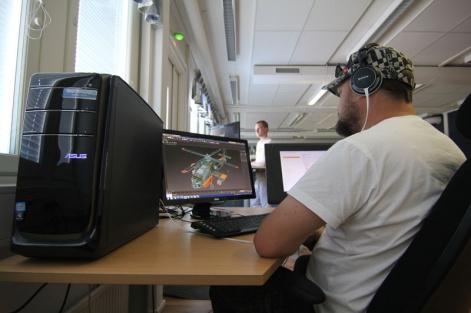Although Finnish mobile game developer Kukouri has been around for almost four years, and its Tiny Trooper games have received over 14 million downloads, the company itself has kept a low profile.
In keeping with this nature, it's not even based in Helsinki. Instead it's based 130 km east of the capital in major sea port Kotka.
So fresh from his appearance on the investment track at Pocket Gamer Connects London 2015, we caught up with Kukouri CEO Kim Soares to find out more about the developer and its plans.
Pocket Gamer: Can you give us some background on Kukouri?
Kim Soares: Kukouri was founded in 2011 by a small but efficient team which has a shared background from other gaming companies.
This is because when I founded Kukouri, I wanted to build a dream team and called up the people who I knew had special talent.
We have a very flat and open organization. I wanted to create a work environment that would support creativity and let people achieve the best possible results.
Everybody takes part in the design process as much as they want. As CEO I keep the team informed on executive level stuff too, so that everyone knows why we are doing what we are doing and how they can best contribute towards the big picture.
It has worked really well. With just eight people, we are making games that other developers need teams 4-5 times larger to make. And still our production times are only 30-50% of many other developers.
We are making games that other developers need teams 4-5 times larger to make.Kim Soares
All this without overtime, crunch and with very flexible hours and the possibility to work from home too.
You're best known for your Tiny Troopers games. Can you tell us more about them?
Kukouri has proved that it can create brands that encompass multiple games on multiple platforms.
The first Tiny Troopers game was published by Chillingo and released in 2012 and since then we've released a new game in the series every year.
The main platform for Kukouri is mobile but Tiny Troopers games have been successfully brought also to consoles, computers and even Samsung SmartTVs.

With over 14 million downloads on mobile devices, Tiny Troopers has quickly become a brand that people recognize. In the chronically over crowded mobile space that is extremely valuable.
What market trends did you experience in 2014 and what are your plans for 2015?
For Kukouri it has been evident for long that mobile games industry is going to consolidate in the same manner that games industry on home computers and on consoles before it.
The exact reasons are different but the effect is same: it becomes increasingly hard for new companies to enter the industry and indies will be pushed to the outer reaches of the markets both in terms of visibility and revenue.
Lucky for the indies, the large companies in mobile, just like in PC and consoles, quickly become very risk averse and stagnant in terms of creativity.
Kukouri's strategy is to use its personnel's deep understanding of the game market to identify openings for new games and brands.

For example, we're currently prototyping a game concept that, remarkably, has no direct competition in the mobile game market.
Our deep understanding of games and ability to act on our findings quickly is our strength as an indie. We already did this with Tiny Troopers and are continuing the same approach in our future games.
How are you finding the current investment environment?
It has two distinct sides. On one side are the traditional institutional investors and VCs.
The problem with traditional VCs is that very few of them understand games industry, let alone actual game development. Many investors I have spoken to openly tell that games are very scary industry from their perspective.
As a result, the ones that do invest into game companies base their decisions almost solely on the career background of the team. But as is already evident, backing teams made out of execs from prominent gaming companies does not automatically spell success.
The problem with traditional VCs is that very few of them understand games industry.Kim Soares
On the other side is a relatively new development in the investment field - the big mobile game developers and publishers that are seeking smaller development companies to invest into, or to outright acquire them.
These are prominently larger mid-sized Asian gaming companies, especially Chinese but also Korean and Japanese.
They are looking to enter Western markets by directly investing into or acquiring existing game developers and they also want to get more Western games for their portfolio in Asian markets.
I think the investor being another game company has many benefits. The most obvious one is that unlike VCs they naturally understand the business and so can offer valuable strategic advice. Another upside is that the developer can tap into the resources of its investor.
Some of the important support roles of modern mobile game development like user acquisition specialists and data analysts are most likely readily available at the investing game company, so the developer can at the very least get good advice or even use these resources during the soft launch and release of its own games.
What specific projects are you looking to get investment for?
Kukouri has just recently started to look for an A round investment.
We’ve continued to work with Chillingo and launched our most recent game Tiny Troopers: Alliance on the App Store in October 2014. The game's performance has been so good that investing in user acquisition makes sense.
We are starting slowly, trying out different networks and platforms to see what works best. At the same time we are finetuning the monetization to further improve the experience for players.

When we are ready to spend large amounts, that's when you need the investment money.
We are also looking to accelerate the company's growth by hiring additional 6-10 people. This is because future games the company is planning are bigger and even more ambitious.
Without going into too much detail, we have plans for a game that is unlike anything out there. It will be heavily social and competitive in nature. That means a robust backend is needed.
Kukouri is known for high-quality games and that requires a lot of work. We are raising the bar for ourselves in this project and that means adding more skilled professionals to our team.
Why do you think these projects offer strong returns for investors?
Usually investors are looking to make an exit from their investment in a few years. Many investors expect the company looking for an investment to have a ready exit plan in place.
That is not the case for Kukouri.
We do not have any exit plan for the investors and, frankly, we think that exit plans do not fit mobile games. With the highly polarized distribution of revenue, you are aiming to multiply the investment by a factor of ten or more. Every year.
I think in mobile games, investors should be looking to make their money from the dividend and not from an exit.Kim Soares
I think in mobile games, investors should be looking to make their money from the dividend and not from an exit.
Then again, if a shareholder wants to make an exit from a successful mobile game developer, it shouldn't be that hard to find interested buyers.
Are alternative investment channels such as crowdfunding interesting to you?
Some game developers have made huge amounts from crowd funding. Kukouri has considered that avenue in the past but it is not that easy method for a Finnish company. You would need to have a US legal entity running the campaign for example.
The likes of Kickstarter are here to stay and I like the concept. You can collect very high figures for your video game project if you are Chris Roberts, Keiji Inafune, David Braben, Richard Garriott or some other game legend who is well-known among the 30-50 year-olds who have money to spend.
Crowdfunding is working for some, but we are focusing on other fields.
What do you think are the biggest challenges in the market at the moment?
The mobile games industry is changing fast and always has. Back in 2011 when Kukouri was founded the landscape was very different.
The amount of apps and games that are released every day have been constantly increasing. Discoverability has become a huge issue and user acquisition costs are getting out of hand.

According to most recent studies the amount of "zombie apps" i.e. apps that are not showing in any of the App Store categories due to their low ranking, is now at whopping 83%.
It is a very tough market, that's for sure. Then again, there are no easy markets. As a developer you cannot make it just by making a mediocre game and then launching it on App Store.
It isn't enough to just make a great game either, not anymore. You have to understand about retention, K-factor, conversion rate and many other factors that are not traditionally part of game development.
You also need to think ahead; what will the market be like in 12-24 months?
At Kukouri we have a very holistic approach to game development. What are challenges to most, can be opportunities to a select few.
You can find out more about what Kukouri gets up to via its website.






















